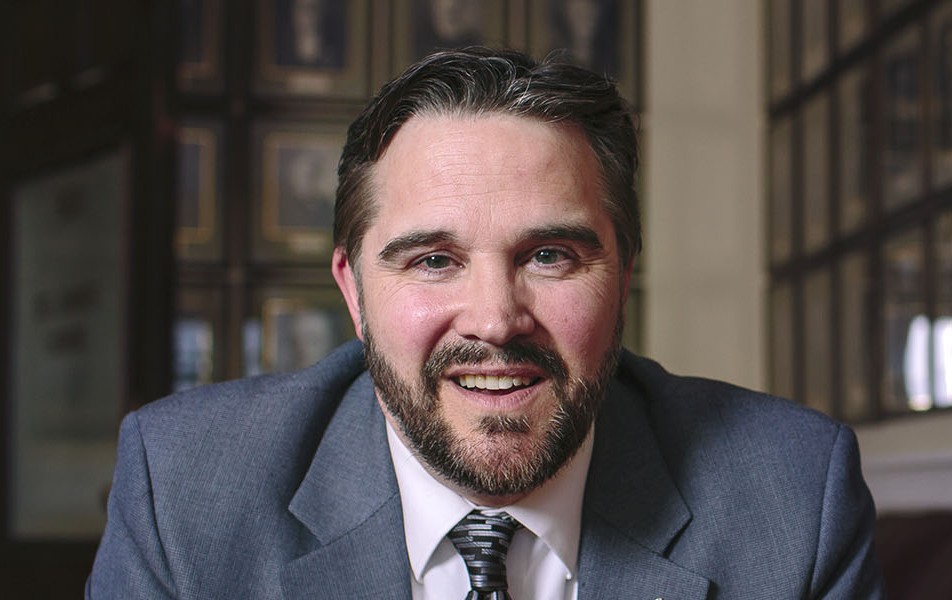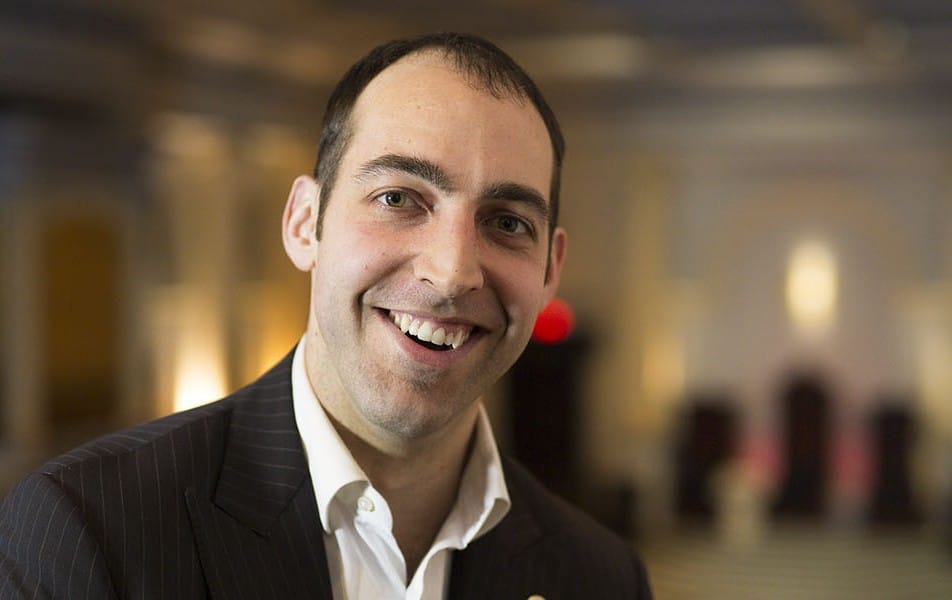Most Worshipful George Washington, Grand Master of the United States?
In March 1780, while American Revolution raged, Worshipful Brother John Brooks of Washington Army Lodge travelled back to Boston to deliver a shocking report to Most Worshipful Joseph Webb, Grand Master of the Independent Massachusetts Grand Lodge: The Grand Lodge of Pennsylvania planned to form a Grand Lodge of the United States with Illustrious Brother George Washington at its head.
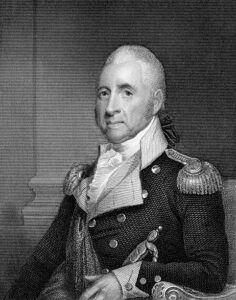
So many questions must have been racing through M.W. Webb’s mind, among them: Why do this now with the ongoing war? What would this mean for the newfound independence of the Massachusetts Grand Lodge if they agreed to this? Would this national Grand Lodge be for all Masons, ‘Ancient’ and ‘Modern’? Or did the Grand Lodge of Pennsylvania see this as a way to expand the influence of ‘Ancient’ Masonry?
With this news, M.W. Webb had an interesting dilemma on his hands: An ‘Ancient’ Grand Lodge of the United States with Ill. Bro. Washington as Grand Master could strengthen ‘Ancient’ Masonry’s presence in the country. Ill. Bro. Washington would no doubt be an excellent pick for this role too. However, what would this mean for relations with Massachusetts’s ‘Modern’ Grand Lodge? Visitations and communication between both had been growing stronger, and M.W. Webb himself was raised in the ‘Modern’ Masters Lodge in 1758. More troubling than all of this, though, M.W. Webb was the first independent Grand Master since they cut ties with the Grand Lodge of Scotland just three years prior in 1777. As the first independent Grand Lodge in North America, were they ready to give that up?

The Massachusetts Grand Lodge’s Response
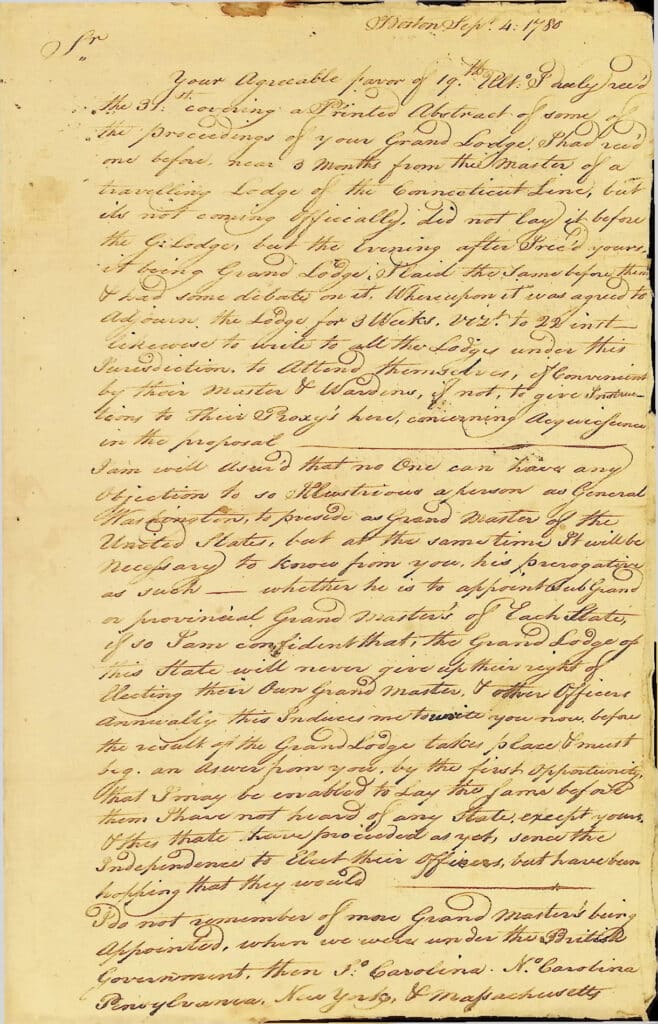
M.W. Webb decided to sit on this information until the Grand Lodge of Pennsylvania reached out officially – which they did on August 19, 1780, requesting the Massachusetts Grand Lodge’s support.
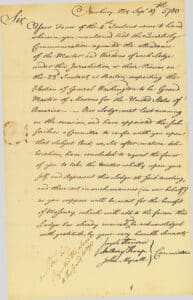
His reply was quick, acknowledging his support for Ill. Bro. George Washington as Grand Master of this hypothetical Grand Lodge but bluntly states that the Massachusetts Grand Lodge will never give up its right to elect its own Grand Lodge officers. He further remarked that he was happy that the Grand Lodge of Pennsylvania declared independence and he was working with New Hampshire Masons to form their own Grand Lodge. In the spirit of the American Revolution, M.W. Webb’s goal had been increasing the number of independent Grand Lodges, not centralizing them.
After some back and forth, M.W. Webb decided to put this question before the subordinate Lodges. Of these only St. Peter’s Lodge’s lukewarm response survives: They neither support nor challenge the proposal and defer to Grand Lodge’s decision.
This lack of enthusiasm was likely felt by most Lodges and is reflected in Grand Lodge’s final report on the matter in January 1781. They ask the Grand Lodge of Pennsylvania to discover the opinions of all the other Grand Lodge’s in the country by calling a convention before they make a final determination. Importantly, the Massachusetts Grand Lodge concluded their report by requesting a notice of this plan be sent to M.W. John Rowe of the ‘Modern’ Grand Lodge of Massachusetts, because they did not want this Grand Lodge of the United States to damage relations with their ‘Modern’ counterpart. Here they foreshadow the unification between the two Grand Lodge’s in 1792:
“One thing we heartily wish which is, that all the Modern G.L. may be invited to come into the Union & that there may be but one G.L. in each state.”
The Project Falls Apart
The Grand Lodge of Pennsylvania issued a response to Massachusetts’ report in March of the same year, deciding to pause their plans until the war had ended, though the project was effectively abandoned by 1785.
It appears that Pennsylvania was relying on Massachusetts’ enthusiastic support to add weight to this proposal. Additionally, asking for the ‘Modern’ Grand Lodge to be included may have further deflated this project if it was Pennsylvania’s goal to craft the Grand Lodge of the United States with only ‘Ancients’ in mind.
Unanswered Questions
What would Masonry look like with a Grand Lodge of the United States? Would all ritual look the same regardless of where you traveled? Would state Grand Lodge’s elect their Grand Masters or would they be appointed? And perhaps the biggest question in all of this: Would George Washington really have served as the first Grand Master? Was he ever asked?
These letters and documents that tell this and many more moments of long forgotten Masonic history, are currently held and preserved at the Samuel Crocker Lawrence Library.

